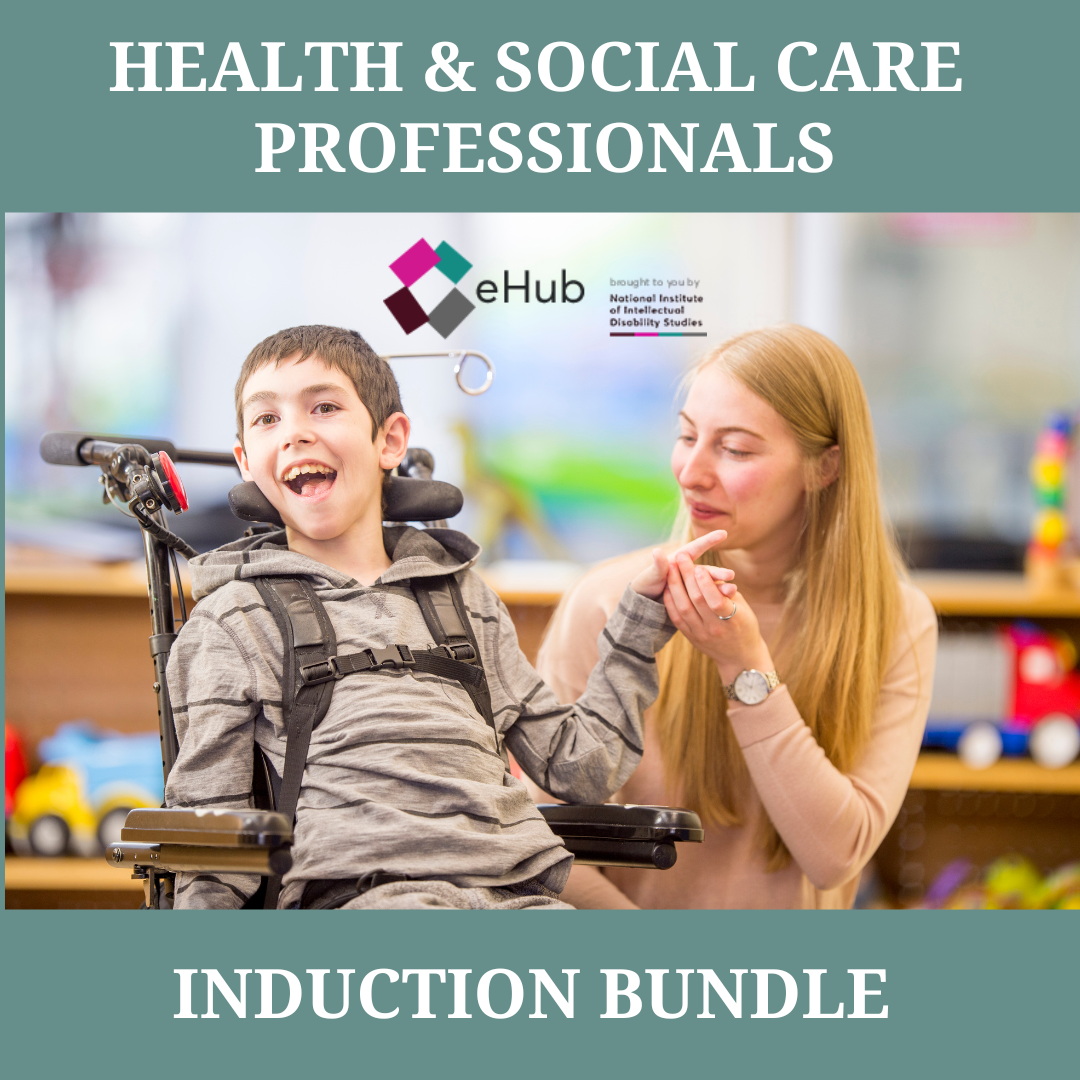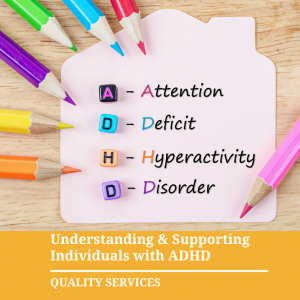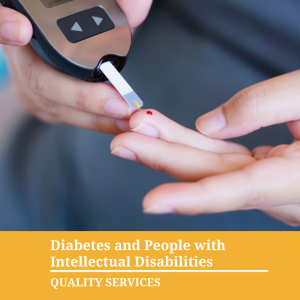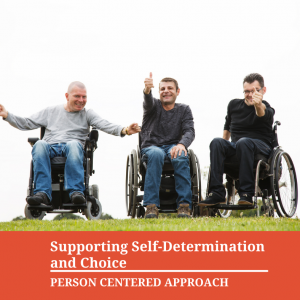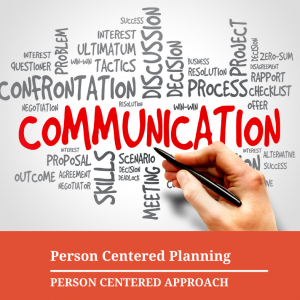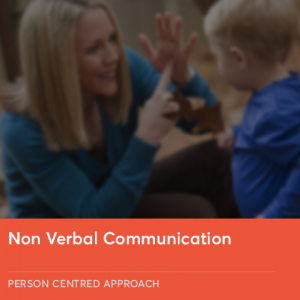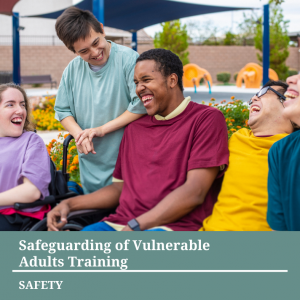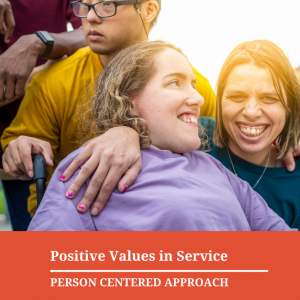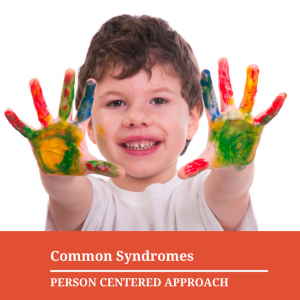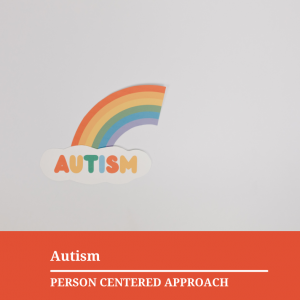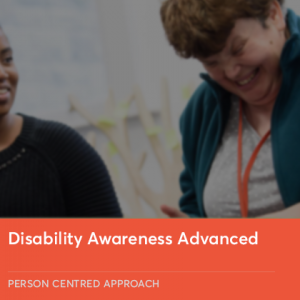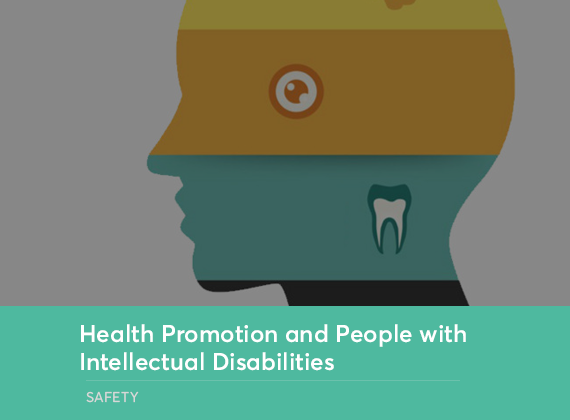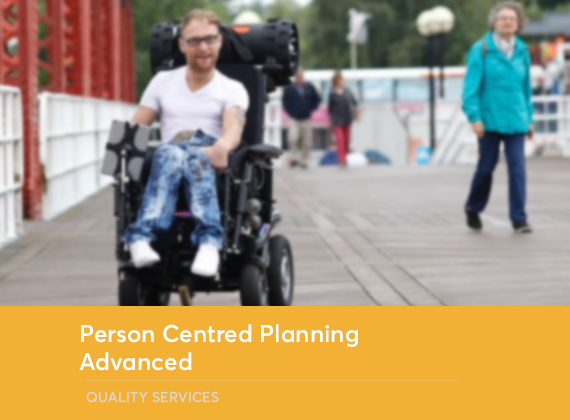-
Understanding and Supporting Individuals with ADHD
€39.99Attention-deficit/hyperactivity disorder is a well-documented neurological disorder: an individual's brain develops and functions differently with ADHD and this can often mean that children and adults who have it, can present with symptoms that are difficult to understand, and can be frustrating for those trying to provide support to them. -
Diabetes and People with Intellectual Disabilities
€29.99Diabetes and People with intellectual disabilities need support from staff to manage their condition and live healthy lives. Without this support they may be at risk of long-term damage to their eyes, heart, kidneys, and feet from excess glucose levels in their blood.. -
Supporting Self-Determination and Choice
€39.99This Supporting Self-Determination and Choice training programme supports the development of competence in direct support workers to assist people with disabilities to express personal preferences, increase control over their lives, and set and attain goals that are personally meaningful. -
Non Verbal Communication
€59.99In order for successful communication to occur, there needs to be a shared system of communication between all parties. Without this messages may be misunderstood and this can lead to frustration... -
Assisted Decision Making Act
€39.99This legislation will replace the Lunacy Regulation (Ireland) Act 1871 and will mean adults with diminished mental capacity will no longer be wards of court; instead a decision-making assistant, a co-decision-maker or an attorney will be appointed based on the capacity of the person... -
Safeguarding of Vulnerable Adults Training
€59.99The issue of abuse and neglect of vulnerable adults has been much highlighted in recent years with various reports identifying alarming levels of abuse both in disability services, older peoples own homes and in care setting. -
Safeguarding of Vulnerable Adults Training Part 1
Aims and Objectives of Programme Overview of Safeguarding Policy and HSE commitment to prevention of Abuse Indicators of Abuse Safeguarding links to HIQA Standards Increase staff knowledge and understanding of what is abuse and neglect Help staff to identify care practices that might lead to or contribute to abuse and neglect Help recognise abuse and neglect Understand and be able to define what is meant by the term abuse how and by whom abuse can take place be able to recognise different types or forms of abuse Be able to identify the possibility and or signs and symptoms a person been abused may display Be able to identify the factors and situations, including work and care practices, which can lead to abuse o Risk Management o Person Centeredness o Human Rights o Culture o Advocacy o Empowerment o Collaboration Discuss best practice strategies in scenarios where abuse may potentially occur Explore key considerations in recognising Abuse such as: Capacity Complaints Anonymous or historical complaints Know how to use the reporting system if you discover or suspect that abuse is taking place. Explain the actions that need to be taken if it is suspected that abuse is taking place -
Safeguarding of Vulnerable Adults Training Part 2
Objectives Discuss best practice strategies in scenarios where abuse may potentially occur Explore key considerations in recognising Abuse such as: Capacity Complaints Anonymous or historical complaint Explain how to use the reporting system and required actions if abuse is discovered or suspected Building Blocks for Safeguarding and Promoting Welfare Reflection #1 Prevention Strategies Case Scenario #1 Risk Management HSE Position on Risk Risk Factors Safeguarding Principles Human Rights Case Scenario #2 HIQA and Human Rights Person Centerdness Case Scenario #3 Case Scenario #4 Culture Safeguarding Policies Reflection #2 Advocacy Advocacy HIQA Standards Case Scenario #5 Empowerment Collaboration Considerations in Recognizing Abuse Recognizing Abuse Signs or Indications of Abuse Capacity Complaints Procedures for Reporting Abuse Responding to Concerns Safeguarding Team Organisational Arrangements Data/Information Making a Report -
Positive Values in Service
€39.99Quality of life for people with disabilities depends on basic attitudes and values of the people who support them and society in general. The reason that many large institutions have been forced to close or reduce the number of residents is not just that of new laws or increases in funding. -
Autism
€59.99This programme is devised to support learners to develop the appropriate knowledge, skills and competence relevant to the support needs of people who have Autism whether they have received a diagnosis or not. -
Disability Awareness Advanced
€79.99Learning Outcomes Learners will be able to: 1 Explore various definitions of disability, to include definitions outlined in Irish legislation 2 Describe the various classifications of disability 3 Outline the models of disability which provide theoretical underpinnings of disability studies, to include the medical model, the social model and the World Health Organisation's International Classification of Functioning and Disability (ICF) 4 Identify different types of disabilities, to include physical disability, learning disability, specific learning difficulties (SPLDs), mental illness, sensorial disabilities specifically visual impairment, hearing loss and speech difficulties and specific conditions including diabetes and epilepsy, explaining how these impact on the individual's quality of life 5 Outline strategies to minimise the difficulties that specific disabilities may cause for individuals 6 Examine the key requirements of employers, educational institutions and providers of public services in accommodating persons with disabilities as set down in Irish legislation 7 Describe the functions of a range of organisations which have been established to develop and implement public policy and strategy in relation to disability in Ireland, to include specific government departments and state agencies 8 Outline the main types of assistive technology that are available to persons with disabilities in education, training and employment 9 Identify grant schemes and support mechanisms that employees with disabilities and employers of persons with disabilities can avail of 10 Identify services available to enable persons with disabilities to access their legal rights and entitlements 11 Explain how organisations providing services to persons with disabilities ensure quality of service and adherence to best practice 12 Distinguish between the various models and approaches which are used in the education system to accommodate persons with disabilities 13 Describe the prevalent models used in vocational and rehabilitative training to achieve outcomes for persons with disabilities 14 Identify barriers to disability, both environmental and attitudinal 15 Outline community interventions that are available to persons with disabilities 16 Explore the impact of disability on the individual and society 17 Assess the strengths and weaknesses of current legislation as it pertains to disability 18 Examine how employees with disabilities can be supported and accommodated in the workplace 3 19 Reflect on own experience and perceptions of disability 20 Assess the strengths and weaknesses of various employment options open to persons with disabilities 21 Evaluate rehabilitation and support strategies that are available to improve quality of life for persons with disabilities 22 Analyse statistical data and research findings on disability 23 Evaluate the quality of a sample of organisational policies and procedures as they pertain to disability. -
Health Promotion and People with Intellectual Disabilities
€39.99Learning Outcomes Learners will be able to: 1 Explain how food is converted into energy and identify the factors that can affect the energy requirements of an individual: weight, height and exercise level 2 Outline current diet guidelines and explain the link between exercise and well-being 3 Demonstrate a basic knowledge of substance and drug abuse 4 Demonstrate an awareness about common illnesses in the population: Emphysema, COPD, Asthma, Diabetes, Heart Disease, etc 5 Identify health issues in the local community 2 6 Identify key agencies at local and national level e.g. medical, social, education, religious and sporting 7 Demonstrate the importance of being a positive role model in promoting a healthy lifestyle in others 8 Identify ways to facilitate change through creative means 9 Identify local resources i.e. funding, key personnel, facilities, etc 10 Identify tasks required for successful implementation of a planned event e.g. design information sheet, booking event, guest speaker 11 Use creative means to promoting healthy living and be able to motivate people (e.g. staff, clients, etc) 12 Adhere to budget guidelines 13 Review of set targets and identifying key issues of a planned event 14 Evaluate their own lifestyle choices 15 Appraise the need for a holistic (mind/body/spirit) approach to wellbeing 16 Set health promotion targets to promote a healthier lifestyle 17 Develop a health promotion event relevant to the local community 18 Demonstrate understanding of how best to motivate people 19 Know how to empower the individual in the local community i.e. education, access to resources, etc 20 Organise a healthy living event e.g. relevant seminar, food demonstration, hike, walk, exercise/dance/yoga class 21 Delegate responsibilities to team members as appropriate and supervise team members as required 22 Identify possible solutions and make recommendation for implementation on future events. -
Positive Behaviour Support Advanced
The Aims of this module are to: Understand the model of positive behaviour support as applied to people with intellectual disability who present with behaviour r Acquire knowledge of the multi-elements of positive behaviour support plans Develop skills in carrying out a comprehensive behavioural assessment and recording the information gathered Acquire skills in completing a functional analysis of target behaviours Develop the ability to design a multi-element Positive Behaviour Support plan incorporating person centred goals and promoting community inclusion Develop skills in monitoring and evaluating the effectiveness of the Positive Behaviour Support plan -
Person Centered Planning Advanced
Module 1 Historical Perspective Module 2 What is Person Centred Planning? Module 3 Legal Aspects Module 4 Communication and Person Centred Planning Module 5 Models of Support Module 6 Person Centred Planning Tools Module 6 Making PCP a Reality Module 7 Writing a PCP Plan Module 8 Supporting Risk Taking Approaches Module 9 Role of Organisation




